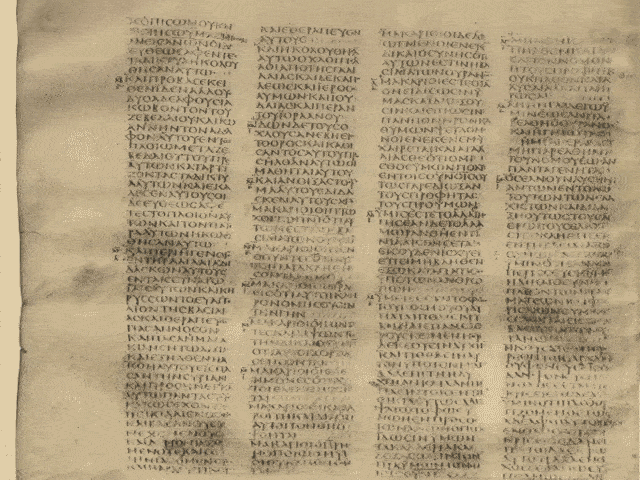My Christian tradition has heroes like every other. This is good, at least when the heroes are good; it’s biblically sound to have heroes (Heb 12:1). The Bible itself offers its (nonetheless flawed) characters in part as moral examples, as heroes. Part of the purpose of the story of Joseph is to make us say, “I ought to be like that”; and Paul outright calls on us all to imitate him, repeatedly (John Frame calls this phenomenon “revelation through persons”).
In my tradition of Reformation Protestantism, all the heroes tend to have arrived on the scene precisely (and this year, I mean precisely) 500 years ago or less. People named “Saint So-and-so” don’t get much airtime.
But years ago I was challenged by a seminary professor—and, separately, by an evangelical Anglican minister—to avoid chronological snobbery that neglects the church fathers. Slowly, by God’s grace, I’m trying to learn more from the teachers God gave me (Eph 4:11–12) before my great-great-great x 10 grandparents were born. A great way to do this is to discover how Christians from across the history of the church—not just since Luther—have interpreted whatever Scripture passage you’re studying.
This unapologetically Reformation-loving Protestant has found two hacks that help me do this. Now, dear reader, I share them with you. Beware: one is nerdy.
1. Use the textual apparatus in your Greek New Testament
The first one is the nerdy one: you can often get insights into the history of interpretation of a passage—sometimes going very far back in church history—by looking at the textual variants in it. The fact is that when we can discern a motivation for any purposeful “changes” to the text of Scripture (frequently we can’t), they are far more often “harmonizations” and other smoothings than they are anything else. Some variants exist, it seems obvious, because scribes saw interpretive difficulties they assumed were errors. (One common theory is that scribe 1 in the second century notices a problem and writes a word in the margin; scribe 2 in the fourth century comes along while copying that manuscript and assumes that the marginal note was meant to go into the text.)
I can’t say precisely how often this kind of interpretive smoothing happens, but I’m working on a project that has me looking at thousands of variants, and I’d say it happens often enough that you should check the textual critical section of the Exegetical Guide—or use the SBLGNT apparatus, or the Lexham Textual Notes—every time you teach a New Testament passage. (I personally am less confident about OT textual criticism—it is markedly different—and will therefore leave it to the side in this post.)
Here’s an example of what I’m talking about: in one of the two earliest and most important complete manuscripts of the New Testament we have, Sinaiticus, someone centuries ago added a little word in the margin next to Jesus’ statement, “Anyone who is angry with his brother shall be liable to judgment.” You can look at a high-resolution picture of this page in the manuscript yourself: the New Testament Manuscript Explorer in Logos will link you to it online. In Greek the added word is four letters long, but it takes two English words to translate it. The word means “without cause.” And it is possible that the word was originally included in Matthew’s Gospel, that the reason it was added to this manuscript was that a previous scribe mistakenly neglected to include it.
This is one of those rare variants that actually makes a significant difference in the meaning of the verse. It clues us in that other Christians in the past noticed an interpretive difficulty and offered a solution. It raises for us an interpretive question we simply must ask: is Jesus condemning all anger, or only anger “without cause”?
I agree with the majority of biblical scholars, who view the word as a later addition, something Jesus didn’t say, an attempt to soften Jesus’ words. But I don’t think the scribe who did this did it out of malice but in order to protect Jesus from saying something that looks like a contradiction.
Jesus himself gets angry at people later in this very same Gospel. He angrily confronts the Pharisees, especially in Matthew 23, and he angrily drives out the moneychangers from the temple in Matthew 21.
When you consider the context of Matthew, and the Bible generally, it’s clear that anger is not always a bad thing. Anger can even be righteous, as in the imprecatory Psalms—and in God himself (Psa 7:11). However, any fair self-evaluation will reveal the truth of what one Christian writer said:
It is unusual for human anger to be free from mixed motives and not be in some sense self-avenging. (Blomberg, NAC 106–107)
Jesus must be speaking about that kind of vengeful, selfish anger, the kind of anger that even righteous anger can be twisted into. Paul says, “Don’t let the sun go down on your wrath,” because sleeping on it never makes this kind of anger better. This anger is not like a headache; it’s like a cancer. Only God can feel defensive anger with purity and never let it fester and decompose into sin. Not until God fully purifies us will we be pure enough to hate evil with perfect hatred (Psa 139:21–22). So I think the Greek textual variant here actually ends up not being significant. The passage means the same thing either way. With rare exceptions, don’t be angry with people. It’s tantamount to murder, because anger is the root of murder.
Somehow I find it comforting that ancient people whose lives were different from mine in ways I can barely imagine had the same exegetical and theological questions I do. Reading a textual variant like this, I feel as though I am reaching through a hole in the wall of time; I touch the ink-stained fingertips of a fellow believer I’ll someday meet; I anticipate the day we will both have access to authoritative commentary.
2. Check the Ancient Christian Commentary
Speaking of which: the presumed authority of patristic authors in other Christian traditions is one of the major reasons people in my tradition are turned off by ancient commentators. Protestantism is an iconoclastic tradition in which icons of Saint So-and-So are liable to get clasted.
But the greatest and earliest heroes of Reformation Protestantism saw Augustine, at the very least, as a hero, too. Augustinian grace theology lies pretty much one level above the apostolic foundation of Protestant faith. Luther was an Augustinian monk. The editor of Calvin’s major work comments that “throughout the Institutes [of the Christian Religion] Calvin’s self-confessed debt to Augustine is constantly apparent.” (lvii)
I couldn’t help but see, too, that Augustine is a world-historical intellectual figure of great importance. But trained as an exegete and having taken few historical theology courses (my fault), I didn’t feel confident in my use of St. Augustine of Hippo. When I did read him, I found this fourth-century theologian to be surprisingly “current.” But he could also go off on flights of allegorical fancy that made me want to clast him a little.
I needed help using Augustine and other fathers. And I found it in the Ancient Christian Commentary Series. I have the ACCS in Logos and have now made it a regular portion of my commentary-checking routine. I am regularly pleased by the pithy comments and interpretive and theological insights I glean from these volumes. I feel like the editors have done the hard work for me and I get to skim the cream off the top of millions of patristic pages, some of which were essentially unavailable for centuries.
The fathers often bring insight to the text of Scripture simply because they come with different cultural perspectives than you and I do. But then some of the illustrations they use work perfectly today, millennia later. I just read Augustine, speaking of taming the tongue, who says:
A horse does not tame itself; a camel does not tame itself; an elephant does not tame itself; a snake does not tame itself; a lion does not tame itself. So too a man does not tame himself. In order to tame a horse, an ox, a camel, an elephant, a lion and a snake, a human being is required. Therefore God should be required in order for a human being to be tamed. (ACCS 102)
That’s precious, and it’s useful. It’s true. Theologians and exegetes like Augustine (and Athanasius and Chrysostom, I find) give me confidence in 2017 that my Protestantism is not wholly discontinuous with their lower-case catholicism and orthodoxy. Their basic approach to exegeting individual Scripture passages is frequently just the same as mine. Sometimes I read them (and Calvin, their heir) and feel as if they have said the last word. It’s helpful and humbling to be reminded that I’m not the first interpreter to encounter Scripture and that wisdom will not die with my generation. As I prepare to teach through Romans this coming year, I intend to make it through the entire ACCS volume on the book.
Mark L. Ward, Jr. received his PhD from Bob Jones University in 2012; he now serves the church as a Logos Pro. His most recent book is Authorized: The Use and Misuse of the King James Bible (forthcoming, Lexham Press).
***
Study the Word with early believers when you get the complete set of the Ancient Christian Commentary on Scripture.






